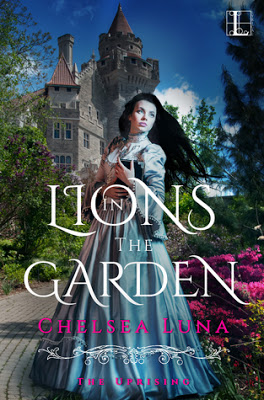Welcome to another session of Turning Pages!
Synopsis: Ludmila Novakova is a girl of wealth and privilege. The daughter of the Chancellor, she has lived her seventeen years as the pampered denizen of Prague Castle, a good Catholic girl who accepts the things she’s been taught – that those of the ruling class are put into place by the grace of God, that the poor are pitiable, but something always with us. But as she grows older, the one thing she can’t accept is being sold off in marriage like a piece of land or cattle — and she’s not having it. Unprepared and completely clueless – dressed in her finery on a good horse with only a cape to cover her diamond-crusted hair ornaments – Mila lights out from the castle, prepared to ride her horse to the country where her aunt lives and change her circumstances. No food, little money, all impulse. She is, of course, set upon almost immediately, her horse lamed then killed, and if it wasn’t for the blacksmith’s son, she would have been in terrible straits.
Mila starts out as foolish but for the most part, she tries to learn from her mistakes. She’s intrigued by the blacksmith, so befriends him, but friendship, she soon learns, between the daughter of the Chancellor and a workingman’s son is a dicey proposition, and much more trouble for him than it’s worth. Worse, though their heady romance blossoms almost immediately, she can’t be sure of his motives. He’s a Protestant, after all, and she knows what they’re all about — upsetting the natural order of things. Her father, the Chancellor, has always told her this. The truth, however, isn’t quite what she’s been told. Mila has seen with her own eyes that the peasants in the village are hungry. The King can’t possibly know what’s going on – what’s being done in his name. Mila has to do something — but what? All that she’s known thus far is turning out to be false. Mila doesn’t know what she can trust anymore – or who – but she’s going to do something. This time, she’s going to change not just her circumstances, but everyone in Prague’s.
 Observations: It’s easy to get “winter slumps” in reading, and I was intrigued by this novel primarily because it was different. The tumultuous time of the Protestant Reformation in the 16th century had a huge impact on much of the western world historically, politically, intellectually, and culturally… yet there’s pretty much crickets in terms of YA novels in the past fifteen years set in that period. Ditto a novel of the Reformation NOT set in Britain or Wales or Scotland, but in central Europe – there’s just not a lot there, despite the fact that plenty happened outside of the British Empire. You can imagine how happy I was to see a novel which delved into custom and religion and expectation of the period. The author sets up the tension between Protestant and Catholic lightly, but the tension is evident. There’s a light discussion of papal indulgences, which really was a flashpoint for Martin Luther, and the reader quickly gets a sense of how dangerous it was to have divergent beliefs in those days. I was slightly disappointed with the characterization of Mila as a good Catholic girl who didn’t seem to have an actual understanding of her religion, though frequently speaking in its defense, nor does the novel seem terribly concerned with the ramifications of being Protestant, and the deep conviction and faith behind it, and how by culture mores and norms it was not that far from Catholicism. (Mila’s casual relationship with Marc would go against her Catholicism and his Protestant beliefs, for instance.)
Observations: It’s easy to get “winter slumps” in reading, and I was intrigued by this novel primarily because it was different. The tumultuous time of the Protestant Reformation in the 16th century had a huge impact on much of the western world historically, politically, intellectually, and culturally… yet there’s pretty much crickets in terms of YA novels in the past fifteen years set in that period. Ditto a novel of the Reformation NOT set in Britain or Wales or Scotland, but in central Europe – there’s just not a lot there, despite the fact that plenty happened outside of the British Empire. You can imagine how happy I was to see a novel which delved into custom and religion and expectation of the period. The author sets up the tension between Protestant and Catholic lightly, but the tension is evident. There’s a light discussion of papal indulgences, which really was a flashpoint for Martin Luther, and the reader quickly gets a sense of how dangerous it was to have divergent beliefs in those days. I was slightly disappointed with the characterization of Mila as a good Catholic girl who didn’t seem to have an actual understanding of her religion, though frequently speaking in its defense, nor does the novel seem terribly concerned with the ramifications of being Protestant, and the deep conviction and faith behind it, and how by culture mores and norms it was not that far from Catholicism. (Mila’s casual relationship with Marc would go against her Catholicism and his Protestant beliefs, for instance.)
And speaking of Marc… yeah, this is a swoonfest, full-fat, sugar-frosted, whipped cream-on-cake-with-ice cream-and-chocolate syrup-and-sugar sprinkles, full on epic romance. I’ll be honest: I don’t read those, because the “love conquers all” suspension of disbelief is something I usually can’t manage, and that much sugar brings on nausea. (Hello, cynicism.) There’s a great deal of trauma and drama in this novel, which seems to be necessary to that style of Great Love romance, but I found myself a bit frustrated with Mila’s Princess-in-the-tower mentality; she has power but doesn’t seem to know how to access it, and someone is always having to save her from impetuousness, after she pulls a knife and has it knocked out of her hands, etc., etc., and that type of thing. It’s frustrating, yet this is the first book in a series, and ends on a triumphant note with almost everyone in place for some real action to begin. As to whether or not further volumes will actually get more into the issues of the Reformation – for some reason, more about a peasant “uprising” than Protestant v. Catholic politics – only time will tell.
Conclusions This novel reads like Romeo and Juliet on acid. I found that the depth of the longing for each other, etc. etc. etc. didn’t match the time they had to get to know each other. People who love romance, really swept-off-their-feet types of romances, may enjoy this more than I did. The premise of the story is promising, but it is not as much about the Reformation and its impact as I had hoped. It is more about star-crossed lovers, a turbulent family history, and a painfully naïve girl who finally — after violence, pain, and death for others – catches a clue about the realities of her world. Paired with lots of tea and a cuddly, rainy weekend, this will be catnip for someone.
I received my copy of this book courtesy of Kensington Publishing. After March 1, you can find LIONS IN THE GARDEN by Chelsea Luna at an online e-tailer, or at a real life, independent bookstore near you!
